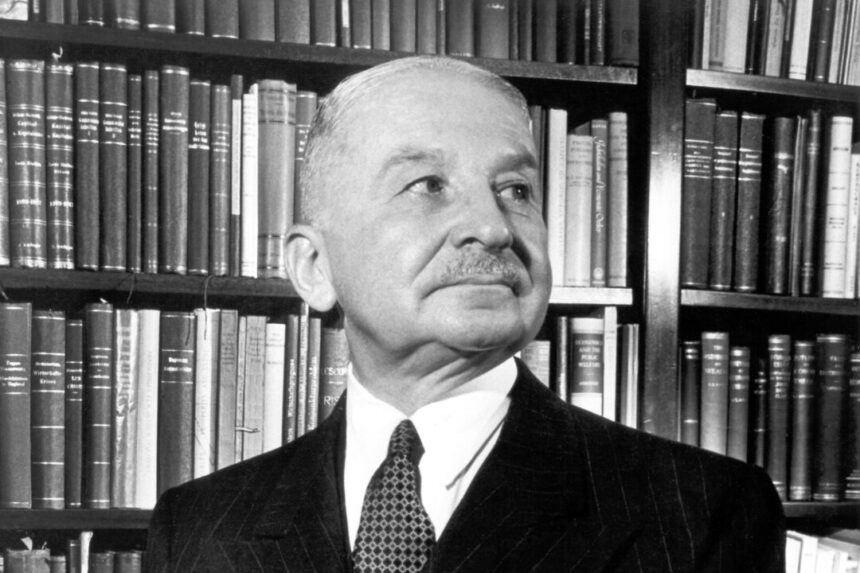Commentary
In 1957, the renowned Austrian economist Ludwig von Mises issued a warning in his influential work on philosophy titled Theory and History. He cautioned about the imminent arrival in the United States of a dangerous doctrine that could potentially undermine the very foundation of civilization.
Mises had witnessed the destructive impact of this doctrine in Europe. He observed its emergence in academic circles, its infiltration into various movements and regimes, and its devastating consequences in Soviet and Nazi totalitarianism. This ideology led to the ruin of his beloved Vienna, forcing him into political exile first in Geneva and then in New York. The doctrine had cast a dark shadow over Europe, previously ravaging Russia and posing a threat to other regions worldwide.
For Mises, intellectual pursuits were not mere intellectual exercises. He recognized how dangerous ideas originating in academia could result in widespread suffering and loss of life. Hence, he devoted himself early in his career to exposing harmful ideas, particularly those that posed a fundamental threat to liberty.
The pernicious doctrine he identified was polylogism. According to this concept, there is no universal logic or truth applicable to all. Each group or interest operates based on its unique logic, making it impossible to determine the correctness or validity of their reasoning. This leads to a denial of reality, even in fields like biology, as everything is subject to individual interpretation.
Mises described polylogism as follows:
“Polylogism denies the uniformity of the logical structure of the human mind. Every social class, every nation, race, or period of history is equipped with a logic that differs from the logic of other classes, nations, races, or ages. Hence bourgeois economics differs from proletarian economics, German physics from the physics of other nations, Aryan mathematics from Semitic mathematics. There is no need to examine here the essentials of the various brands of polylogism. For polylogism never went beyond the simple declaration that a diversity of the mind’s logical structure exists. It never pointed out in what these differences consist, for instance how the logic of the proletarians differs from that of the bourgeois. All the champions of polylogism did was to reject definite statements by referring to unspecified peculiarities of their author’s logic.”
These implications are profound. The absence of a universal logic undermines concepts like human rights, law, constitution, and meaningful language. Valid arguments are rendered meaningless, leading to a world where all viewpoints are considered equally valid, even if they are based solely on emotions and intuitions.
Under polylogism, the very notion of fallacy and logic textbooks lose their significance, as there are no absolute truths or incorrect statements. This mindset creates a chaotic environment where established concepts in mathematics, science, and economics are dismissed as arbitrary constructs. In such a world, even basic principles like 2+2=5 can be accepted without question.
Marx applied this idea to the conflict between workers and capital owners, rejecting fundamental economic principles like supply and demand. This rejection of traditional economic logic posed challenges for leaders like Soviet premier Nikita Khrushchev when seeking solutions for economic growth without resorting to established economic principles.
Christopher Rufo’s book, “America’s Cultural Revolution,” explores how this Marxian conflict theory extended to various other societal aspects, fueling conflicts based on race, gender, religion, and nationality, ultimately leading to power struggles. According to Rufo, this ideology has taken root in the United States, contributing to its societal decay.
Mises believed that the root of the problem lay in polylogism itself, which completely disregards the validity of logic. This denial of logical norms began with G.F. Hegel before Marx, who introduced deterministic historical forces operating beyond human reasoning and truth. These Hegelian ideas diverged into left-wing (Marxian) and right-wing (fascist and Nazi) factions, both seeking to undermine traditional logic and establish totalitarian control.
Mises concluded that the success of totalitarian regimes hinged on dismantling traditional logic and its branches, including mathematics, science, economics, and liberal politics. In a world devoid of logical structure, anything becomes possible, eroding the very foundations of truth and reason.
It is often said, with a hint of disdain, that nothing is true, or at least nothing is “cap T true.” All truth claims are seen as mere beliefs, their validity dependent on political whims.
But why do people hold this belief? Perhaps because logic is no longer emphasized in schools and universities.
While some may argue that logic is still taught in certain disciplines like philosophy, the reality is that classical education, which once focused on grammar, logic, and rhetoric, has been replaced by a curriculum centered around complaining, self-obsessing, and grifting.
Reflecting on my own education, I remember immersing myself in various subjects in college without realizing the importance of a solid foundation in logic. It was only when preparing for law school exams that I discovered the rules of thinking, reasoning, and communicating.
It was a revelation to learn that logic had been marginalized in education since the 1960s, possibly as a result of intentional neglect. This shift coincided with Herbert Marcuse’s idea of “Repressive Tolerance,” which aimed to overthrow traditional concepts of freedom through state oppression.
Without a recognition of universal logic, the state can easily assume control, as advocated by philosophers like Hegel and his follower Lassalle. The concept of polylogism, championed by tyrants, is a dangerous ideology that undermines the principles of rational thought.
It is essential to acknowledge the importance of logic in education and resist the trend of devaluing this fundamental discipline.
Views expressed in this article are opinions of the author and do not necessarily reflect the views of The Epoch Times.








